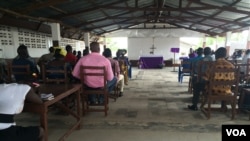Five months ago at the height of the Ebola crisis, social life in Liberia was at a standstill, as people tried to avoid touching to keep themselves from catching the deadly virus. With new Ebola cases now down to zero, Liberians have returned to popular beaches and nightclubs. People are glad social life has returned, even though the worries have not entirely faded away.
It was a beautiful Sunday afternoon, almost too nice for work. Monrovia lay under a blue sky. The ocean roared. Dripping all over, 28-year-old Derrick Tamba has just had a dip in the water with friends.
“I started coming back to the beach right after the government first they announced that they were lifting up the curfew and they also announced that they were reopening our schools," said Tamba. "So looking at that information I thought it was wise coming back to the beach. I think it is a time where we can come back and reflect and just enjoy the cool times we used to have with our friends out here.”
Unlike months ago during the height of the Ebola crisis, many people are on Monrovia’s beaches. With the infection rate at zero for weeks, social life has returned to normal. Liberians enjoy their street food, and share meals and drinks again with each other. They are cramming into public buses and cabs without worry.
They also flock to churches where chlorine for disinfecting hands remains in buckets at the entrance. And with curfews being lifted, Liberians have also returned to nightclubs.
Five months ago, Exodus Bar in central Monrovia already closed at 9 p.m. on a Saturday night. Fast forward to a Saturday night in March, it was filled to the brim with people who stayed until the early morning hours. But not everybody feels comfortable. Honey Davis sits outside on a terrace quietly sipping a beer. She says she only came out tonight to celebrate her sister’s wedding, but avoids the melee inside and shaking people’s hands.
“I just sit, like hiding myself, you know, from people, because I know when we are with other people they want to say ‘Hi’. So I mean that is why I sit in this corner, trying to just have one or two bottles and go home,” Davis said.
Ebola impacted every aspect of social life, including relationships. Two brothers in their early 20s, Jamal and Isaiah Williams, said five months ago they avoided intimacy with their girlfriends as a precaution. While Isaiah had broken up in the meantime, he said it was not due to Ebola and people are again close with each other.
“After Ebola has subsided in Liberia, normal activities resumed and the excitement was too high," said Isaiah Williams.
His brother Jamal was also again on good terms with a friend whom he had avoided because there was a case of Ebola in his family. But Jamal now has another, much bigger problem.
“All the little cash we had before the Ebola crisis, we used everything during the crisis. So there was nothing left to actually help us in getting back to school or doing other things," said Jamal Williams.
Jamal says he struggles to find a job and does not know what to do. The rent for the brothers' small room in the Lakpaze area of Monrovia is long overdue. He applied for work at several places, even walked all the way to his representative’s office on Capitol Hill because he did not have the money for transport. But he says he has not heard back from anyone.
Jamal said even though social life has returned to Liberia, that does not mean things are OK. Liberians still face the same problems as before the Ebola crisis.






